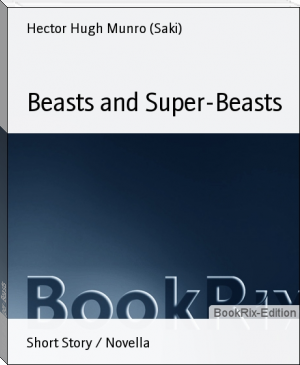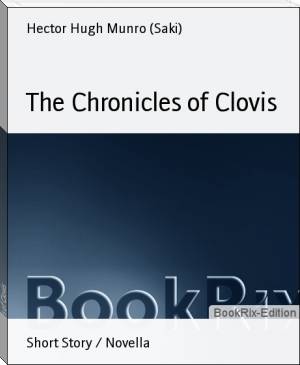The Toys of Peace - Hector Hugh Munro (Saki) (best ereader manga .txt) 📗

- Author: Hector Hugh Munro (Saki)
Book online «The Toys of Peace - Hector Hugh Munro (Saki) (best ereader manga .txt) 📗». Author Hector Hugh Munro (Saki)
party, but it made no more impression on Hyacinth than the squealing tempest that raged within the stye.
"If Jutterly heads the poll I'm going to let the sow in. I'll teach the blighters to win elections from us."
"He means it," said Mrs. Panstreppon; "I feared the worst when I saw that butterscotch incident."
"It's all right, my little man," said Jutterly, with the duplicity to which even a Colonial Secretary can sometimes stoop, "your father has been elected by a large majority."
"Liar!" retorted Hyacinth, with the directness of speech that is not merely excusable, but almost obligatory, in the political profession; "the votes aren't counted yet. You won't gammon me as to the result, either. A boy that I've palled with is going to fire a gun when the poll is declared; two shots if we've won, one shot if we haven't."
The situation began to look critical. "Drug the sow," whispered Hyacinth's father.
Some one went off in the motor to the nearest chemist's shop and returned presently with two large pieces of bread, liberally dosed with narcotic. The bread was thrown deftly and unostentatiously into the stye, but Hyacinth saw through the manoeuvre. He set up a piercing imitation of a small pit in Purgatory, and the infuriated mother ramped round and round the stye; the pieces of bread were trampled into slush.
At any moment now the poll might be declared. Jutterly flew back to the Town Hall, where the votes were being counted. His agent met him with a smile of hope.
"You're eleven ahead at present, and only about eighty more to be counted; you're just going to squeak through."
"I mustn't squeak through," exclaimed Jutterly, hoarsely. "You must object to every doubtful vote on our side that can possibly be disallowed. I must not have the majority."
Then was seen the unprecedented sight of a party agent challenging the votes on his own side with a captiousness that his opponents would have hesitated to display. One or two votes that would have certainly passed muster under ordinary circumstances were disallowed, but even so Jutterly was six ahead with only thirty more to be counted.
To the watchers by the stye the moments seemed intolerable. As a last resort some one had been sent for a gun with which to shoot the sow, though Hyacinth would probably draw the bolt the moment such a weapon was brought into the yard. Nearly all the men were away from their homes, however, on election night, and the messenger had evidently gone far afield in his search. It must be a matter of minutes now to the declaration of the poll.
A sudden roar of shouting and cheering was heard from the direction of the Town Hall. Hyacinth's father clutched a pitchfork and prepared to dash into the stye in the forlorn hope of being in time.
A shot rang out in the evening air. Hyacinth stooped down from his perch and put his finger on the bolt. The sow pressed furiously against the door.
"Bang," came another shot.
Hyacinth wriggled back, and sent a short ladder down through the window of the inner stye.
"Now you can come up, you unclean little blighters," he sang out; "my daddy's got in, not yours. Hurry up, I can't keep the sow waiting much longer. And don't you jolly well come butting into any election again where I'm on the job."
In the reaction that set in after the deliverance furious recrimination were indulged in by the lately opposed candidates, their women folk, agents, and party helpers. A recount was demanded, but failed to establish the fact that the Colonial Secretary had obtained a majority. Altogether the election left a legacy of soreness behind it, apart from any that was experienced by Hyacinth in person.
"It is the last time I shall let him go to an election," exclaimed his mother.
"There I think you are going to extremes," said Mrs. Panstreppon; "if there should be a general election in Mexico I think you might safely let him go there, but I doubt whether our English politics are suited to the rough and tumble of an angel-child."
THE IMAGE OF THE LOST SOLE
There were a number of carved stone figures placed at intervals along the parapets of the old Cathedral; some of them represented angels, others kings and bishops, and nearly all were in attitudes of pious exaltation and composure. But one figure, low down on the cold north side of the building, had neither crown, mitre, not nimbus, and its face was hard and bitter and downcast; it must be a demon, declared the fat blue pigeons that roosted and sunned themselves all day on the ledges of the parapet; but the old belfry jackdaw, who was an authority on ecclesiastical architecture, said it was a lost soul. And there the matter rested.
One autumn day there fluttered on to the Cathedral roof a slender, sweet- voiced bird that had wandered away from the bare fields and thinning hedgerows in search of a winter roosting-place. It tried to rest its tired feet under the shade of a great angel-wing or to nestle in the sculptured folds of a kingly robe, but the fat pigeons hustled it away from wherever it settled, and the noisy sparrow-folk drove it off the ledges. No respectable bird sang with so much feeling, they cheeped one to another, and the wanderer had to move on.
Only the effigy of the Lost Soul offered a place of refuge. The pigeons did not consider it safe to perch on a projection that leaned so much out of the perpendicular, and was, besides, too much in the shadow. The figure did not cross its hands in the pious attitude of the other graven dignitaries, but its arms were folded as in defiance and their angle made a snug resting-place for the little bird. Every evening it crept trustfully into its corner against the stone breast of the image, and the darkling eyes seemed to keep watch over its slumbers. The lonely bird grew to love its lonely protector, and during the day it would sit from time to time on some rainshoot or other abutment and trill forth its sweetest music in grateful thanks for its nightly shelter. And, it may have been the work of wind and weather, or some other influence, but the wild drawn face seemed gradually to lose some of its hardness and unhappiness. Every day, through the long monotonous hours, the song of his little guest would come up in snatches to the lonely watcher, and at evening, when the vesper-bell was ringing and the great grey bats slid out of their hiding-places in the belfry roof, the bright-eyed bird would return, twitter a few sleepy notes, and nestle into the arms that were waiting for him. Those were happy days for the Dark Image. Only the great bell of the Cathedral rang out daily its mocking message, "After joy . . . sorrow."
The folk in the verger's lodge noticed a little brown bird flitting about the Cathedral precincts, and admired its beautiful singing. "But it is a pity," said they, "that all that warbling should be lost and wasted far out of hearing up on the parapet." They were poor, but they understood the principles of political economy. So they caught the bird and put it in a little wicker cage outside the lodge door.
That night the little songster was missing from its accustomed haunt, and the Dark Image knew more than ever the bitterness of loneliness. Perhaps his little friend had been killed by a prowling cat or hurt by a stone. Perhaps . . . perhaps he had flown elsewhere. But when morning came there floated up to him, through the noise and bustle of the Cathedral world, a faint heart-aching message from the prisoner in the wicker cage far below. And every day, at high noon, when the fat pigeons were stupefied into silence after their midday meal and the sparrows were washing themselves in the street-puddles, the song of the little bird came up to the parapets--a song of hunger and longing and hopelessness, a cry that could never be answered. The pigeons remarked, between mealtimes, that the figure leaned forward more than ever out of the perpendicular.
One day no song came up from the little wicker cage. It was the coldest day of the winter, and the pigeons and sparrows on the Cathedral roof looked anxiously on all sides for the scraps of food which they were dependent on in hard weather.
"Have the lodge-folk thrown out anything on to the dust-heap?" inquired one pigeon of another which was peering over the edge of the north parapet.
"Only a little dead bird," was the answer.
There was a crackling sound in the night on the Cathedral roof and a noise as of falling masonry. The belfry jackdaw said the frost was affecting the fabric, and as he had experienced many frosts it must have been so. In the morning it was seen that the Figure of the Lost Soul had toppled from its cornice and lay now in a broken mass on the dust-heap outside the verger's lodge.
"It is just as well," cooed the fat pigeons, after they had peered at the matter for some minutes; "now we shall have a nice angel put up there. Certainly they will put an angel there."
"After joy . . . sorrow," rang out the great bell.
THE PURPLE OF THE BALKAN KINGS
Luitpold Wolkenstein, financier and diplomat on a small, obtrusive, self- important scale, sat in his favoured cafe in the world-wise Habsburg capital, confronted with the Neue Freie Presse and the cup of cream- topped coffee and attendant glass of water that a sleek-headed piccolo had just brought him. For years longer than a dog's lifetime sleek-headed piccolos had placed the Neue Freie Presse and a cup of cream-topped coffee on his table; for years he had sat at the same spot, under the dust-coated, stuffed eagle, that had once been a living, soaring bird on the Styrian mountains, and was now made monstrous and symbolical with a second head grafted on to its neck and a gilt crown planted on either dusty skull. To-day Luitpold Wolkenstein read no more than the first article in his paper, but read it again and again.
"The Turkish fortress of Kirk Kilisseh has fallen . . . The Serbs, it is officially announced, have taken Kumanovo . . . The fortress of Kirk Kilisseh lost, Kumanovo taken by the Serbs, these are tiding for Constantinople resembling something out of Shakspeare's tragedies of the kings . . . The neighbourhood of Adrianople and the Eastern region, where the great battle is now in progress, will not reveal merely the future of Turkey, but also what position and what influence the Balkan States are to have in the world."
For years longer than a dog's lifetime Luitpold Wolkenstein had disposed of the pretensions and strivings of the Balkan States over the cup of cream-topped coffee that sleek-headed piccolos had brought him. Never travelling further eastward than the horse-fair at Temesvar, never inviting personal risk in an encounter with anything more potentially desperate than a hare or partridge, he had constituted himself the critical appraiser and arbiter of the military and national prowess
"If Jutterly heads the poll I'm going to let the sow in. I'll teach the blighters to win elections from us."
"He means it," said Mrs. Panstreppon; "I feared the worst when I saw that butterscotch incident."
"It's all right, my little man," said Jutterly, with the duplicity to which even a Colonial Secretary can sometimes stoop, "your father has been elected by a large majority."
"Liar!" retorted Hyacinth, with the directness of speech that is not merely excusable, but almost obligatory, in the political profession; "the votes aren't counted yet. You won't gammon me as to the result, either. A boy that I've palled with is going to fire a gun when the poll is declared; two shots if we've won, one shot if we haven't."
The situation began to look critical. "Drug the sow," whispered Hyacinth's father.
Some one went off in the motor to the nearest chemist's shop and returned presently with two large pieces of bread, liberally dosed with narcotic. The bread was thrown deftly and unostentatiously into the stye, but Hyacinth saw through the manoeuvre. He set up a piercing imitation of a small pit in Purgatory, and the infuriated mother ramped round and round the stye; the pieces of bread were trampled into slush.
At any moment now the poll might be declared. Jutterly flew back to the Town Hall, where the votes were being counted. His agent met him with a smile of hope.
"You're eleven ahead at present, and only about eighty more to be counted; you're just going to squeak through."
"I mustn't squeak through," exclaimed Jutterly, hoarsely. "You must object to every doubtful vote on our side that can possibly be disallowed. I must not have the majority."
Then was seen the unprecedented sight of a party agent challenging the votes on his own side with a captiousness that his opponents would have hesitated to display. One or two votes that would have certainly passed muster under ordinary circumstances were disallowed, but even so Jutterly was six ahead with only thirty more to be counted.
To the watchers by the stye the moments seemed intolerable. As a last resort some one had been sent for a gun with which to shoot the sow, though Hyacinth would probably draw the bolt the moment such a weapon was brought into the yard. Nearly all the men were away from their homes, however, on election night, and the messenger had evidently gone far afield in his search. It must be a matter of minutes now to the declaration of the poll.
A sudden roar of shouting and cheering was heard from the direction of the Town Hall. Hyacinth's father clutched a pitchfork and prepared to dash into the stye in the forlorn hope of being in time.
A shot rang out in the evening air. Hyacinth stooped down from his perch and put his finger on the bolt. The sow pressed furiously against the door.
"Bang," came another shot.
Hyacinth wriggled back, and sent a short ladder down through the window of the inner stye.
"Now you can come up, you unclean little blighters," he sang out; "my daddy's got in, not yours. Hurry up, I can't keep the sow waiting much longer. And don't you jolly well come butting into any election again where I'm on the job."
In the reaction that set in after the deliverance furious recrimination were indulged in by the lately opposed candidates, their women folk, agents, and party helpers. A recount was demanded, but failed to establish the fact that the Colonial Secretary had obtained a majority. Altogether the election left a legacy of soreness behind it, apart from any that was experienced by Hyacinth in person.
"It is the last time I shall let him go to an election," exclaimed his mother.
"There I think you are going to extremes," said Mrs. Panstreppon; "if there should be a general election in Mexico I think you might safely let him go there, but I doubt whether our English politics are suited to the rough and tumble of an angel-child."
THE IMAGE OF THE LOST SOLE
There were a number of carved stone figures placed at intervals along the parapets of the old Cathedral; some of them represented angels, others kings and bishops, and nearly all were in attitudes of pious exaltation and composure. But one figure, low down on the cold north side of the building, had neither crown, mitre, not nimbus, and its face was hard and bitter and downcast; it must be a demon, declared the fat blue pigeons that roosted and sunned themselves all day on the ledges of the parapet; but the old belfry jackdaw, who was an authority on ecclesiastical architecture, said it was a lost soul. And there the matter rested.
One autumn day there fluttered on to the Cathedral roof a slender, sweet- voiced bird that had wandered away from the bare fields and thinning hedgerows in search of a winter roosting-place. It tried to rest its tired feet under the shade of a great angel-wing or to nestle in the sculptured folds of a kingly robe, but the fat pigeons hustled it away from wherever it settled, and the noisy sparrow-folk drove it off the ledges. No respectable bird sang with so much feeling, they cheeped one to another, and the wanderer had to move on.
Only the effigy of the Lost Soul offered a place of refuge. The pigeons did not consider it safe to perch on a projection that leaned so much out of the perpendicular, and was, besides, too much in the shadow. The figure did not cross its hands in the pious attitude of the other graven dignitaries, but its arms were folded as in defiance and their angle made a snug resting-place for the little bird. Every evening it crept trustfully into its corner against the stone breast of the image, and the darkling eyes seemed to keep watch over its slumbers. The lonely bird grew to love its lonely protector, and during the day it would sit from time to time on some rainshoot or other abutment and trill forth its sweetest music in grateful thanks for its nightly shelter. And, it may have been the work of wind and weather, or some other influence, but the wild drawn face seemed gradually to lose some of its hardness and unhappiness. Every day, through the long monotonous hours, the song of his little guest would come up in snatches to the lonely watcher, and at evening, when the vesper-bell was ringing and the great grey bats slid out of their hiding-places in the belfry roof, the bright-eyed bird would return, twitter a few sleepy notes, and nestle into the arms that were waiting for him. Those were happy days for the Dark Image. Only the great bell of the Cathedral rang out daily its mocking message, "After joy . . . sorrow."
The folk in the verger's lodge noticed a little brown bird flitting about the Cathedral precincts, and admired its beautiful singing. "But it is a pity," said they, "that all that warbling should be lost and wasted far out of hearing up on the parapet." They were poor, but they understood the principles of political economy. So they caught the bird and put it in a little wicker cage outside the lodge door.
That night the little songster was missing from its accustomed haunt, and the Dark Image knew more than ever the bitterness of loneliness. Perhaps his little friend had been killed by a prowling cat or hurt by a stone. Perhaps . . . perhaps he had flown elsewhere. But when morning came there floated up to him, through the noise and bustle of the Cathedral world, a faint heart-aching message from the prisoner in the wicker cage far below. And every day, at high noon, when the fat pigeons were stupefied into silence after their midday meal and the sparrows were washing themselves in the street-puddles, the song of the little bird came up to the parapets--a song of hunger and longing and hopelessness, a cry that could never be answered. The pigeons remarked, between mealtimes, that the figure leaned forward more than ever out of the perpendicular.
One day no song came up from the little wicker cage. It was the coldest day of the winter, and the pigeons and sparrows on the Cathedral roof looked anxiously on all sides for the scraps of food which they were dependent on in hard weather.
"Have the lodge-folk thrown out anything on to the dust-heap?" inquired one pigeon of another which was peering over the edge of the north parapet.
"Only a little dead bird," was the answer.
There was a crackling sound in the night on the Cathedral roof and a noise as of falling masonry. The belfry jackdaw said the frost was affecting the fabric, and as he had experienced many frosts it must have been so. In the morning it was seen that the Figure of the Lost Soul had toppled from its cornice and lay now in a broken mass on the dust-heap outside the verger's lodge.
"It is just as well," cooed the fat pigeons, after they had peered at the matter for some minutes; "now we shall have a nice angel put up there. Certainly they will put an angel there."
"After joy . . . sorrow," rang out the great bell.
THE PURPLE OF THE BALKAN KINGS
Luitpold Wolkenstein, financier and diplomat on a small, obtrusive, self- important scale, sat in his favoured cafe in the world-wise Habsburg capital, confronted with the Neue Freie Presse and the cup of cream- topped coffee and attendant glass of water that a sleek-headed piccolo had just brought him. For years longer than a dog's lifetime sleek-headed piccolos had placed the Neue Freie Presse and a cup of cream-topped coffee on his table; for years he had sat at the same spot, under the dust-coated, stuffed eagle, that had once been a living, soaring bird on the Styrian mountains, and was now made monstrous and symbolical with a second head grafted on to its neck and a gilt crown planted on either dusty skull. To-day Luitpold Wolkenstein read no more than the first article in his paper, but read it again and again.
"The Turkish fortress of Kirk Kilisseh has fallen . . . The Serbs, it is officially announced, have taken Kumanovo . . . The fortress of Kirk Kilisseh lost, Kumanovo taken by the Serbs, these are tiding for Constantinople resembling something out of Shakspeare's tragedies of the kings . . . The neighbourhood of Adrianople and the Eastern region, where the great battle is now in progress, will not reveal merely the future of Turkey, but also what position and what influence the Balkan States are to have in the world."
For years longer than a dog's lifetime Luitpold Wolkenstein had disposed of the pretensions and strivings of the Balkan States over the cup of cream-topped coffee that sleek-headed piccolos had brought him. Never travelling further eastward than the horse-fair at Temesvar, never inviting personal risk in an encounter with anything more potentially desperate than a hare or partridge, he had constituted himself the critical appraiser and arbiter of the military and national prowess
Free e-book «The Toys of Peace - Hector Hugh Munro (Saki) (best ereader manga .txt) 📗» - read online now
Similar e-books:





Comments (0)